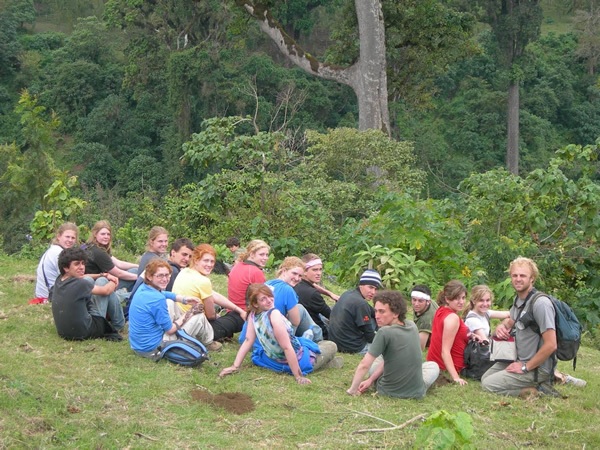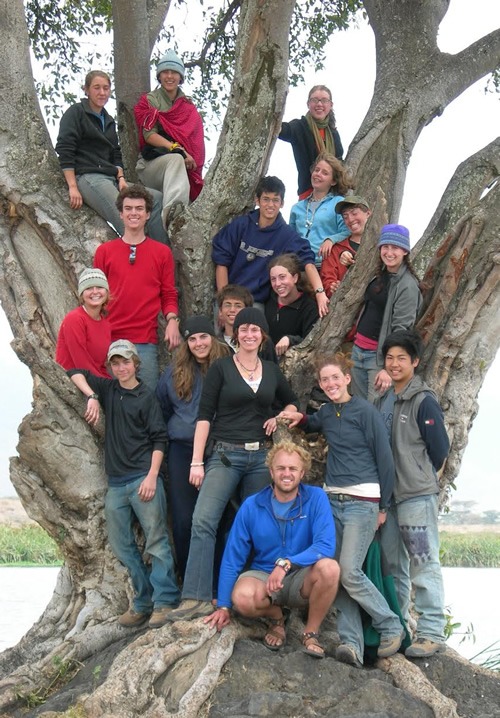Summer Jobs Leading International Programs for High School Students
Article and photos by John B. Linsley
 |
The author (on the right) leading a High School student group in Tanzania. |
When introducing myself at a recent alumni event for my college, I spoke of teaching history and managing a boys’ dormitory at a boarding school. The crowd’s reaction was, “you run a dorm, very brave.” When I mentioned my summer job of leading high school students to Africa, the response was “even braver!” Maybe they had a valid point. Leading 16 adolescents on a month of community service work and safari in rural Tanzania does come with great responsibility. If you think you are not qualified to work with high school students abroad, stop and consider what you have to offer, and you might just find that your resume is more competitive than you thought.
Many student travel companies offer international summer programs for high school students. Group size varies, but usually hovers in the teens with two co-leaders. Lengths generally fall between three and six weeks. Program themes range from community service to language acquisition, cultural exploration, academic study, global issues, and wilderness adventure. In the past, programs outside of Europe and North America were rare, and while these destinations remain popular, programs in South America, Asia, and Africa are now a hot commodity among adventurous teenagers. A European summer program presents its own set of challenges. However, programs in the developing world demand that leaders have the skills to meet program objectives, amid unforeseen obstacles, and often without access to first world resources.
Fundamental to your leader application is experience interacting with teenagers on an individual or group basis. Experience can be demonstrated through past work as a teacher, dorm parent, tutor, club or extracurricular adviser, mentor, college admissions officer, outdoor educator, camp counselor, or coach. Equally important is experience in the country or region in which you intend to lead. So, the college semester you spent in South Africa, the winter term course you took in China, or the summer you spent backpacking in East Africa, will add major weight to your resume. Do not discount experiences which might seem trivial such as the few days you spent volunteering while on vacation in Mexico. Each experience lends insight to your regional and country expertise.
 |
The author (seated at bottom) leading a High School student group in Tanzania. |
As developing countries, particularly those in Asia and Africa, have become popular destinations, demand for leaders with training in local and regional languages has grown. Abilities in Mandarin, Hindi, Thai, Khmer, and Vietnamese will be useful in Asia. Languages common to Africa program destinations include Swahili, Wolof, Afrikaans, Xhosa, Zulu, Setswana, and for much of West Africa, French. Spanish and Portuguese are musts for South America. And for Europe, English, combined with some knowledge of other European languages spoken in the countries you will visit will suffice.
While English is spoken in many developing world cities, itineraries commonly include extensive rural components during which opportunities to use English may be limited. Knowledge of the local language is a great asset, for example, when negotiating the price of construction materials for a community service project with local sellers, setting up homestays, organizing transportation and medical care, communicating with host communities and program contacts, or when translating an interview of a local resident for a student research project.
Certification in CPR and first aid is a baseline for most employers. Advanced certification as a First Responder or EMT is desirable, and may be required in some cases. Wilderness medicine training is also a valuable skill, especially for programs in remote regions of developing countries with limited access to hospitals or clinics. Certification levels range from Wilderness First Aid, to Wilderness First Responder and Wilderness EMT. Major topics covered include long term care of injury and illness, improvisation techniques, bites and stings, and evacuation. The leader in the field of wilderness medicine training is (SOLO) Wilderness Training. Costs for any type of medical certification can be significant, especially at the EMT level. Universities may offer medical courses as extracurriculars which enrolled students can take inexpensively or even audit. Civic organizations and fire/rescue departments (especially those seeking volunteers) may offer courses at low cost. Additionally, community colleges’ offerings are also worth exploring.
Along with hard skills in languages and first aid, leaders must be aware of risk and make prudent decisions on the fly in high pressure, multicultural situations. Confidence in your interpersonal skills is crucial when interacting with both your students and co-leader. Teenagers are keen observers, attuned to demonstrated strengths and weaknesses in your leadership ability. You should feel comfortable negotiating the appropriate balance of friend and leader with students, exhibiting enthusiasm and energy when group morale is low, motivating students to achieve personal and program goals, guiding students as they immerse themselves in a new culture, and encouraging them to serve as gracious ambassadors of their home countries.
In those first years after college, when so many graduates have yet to settle on a full time job, taking a summer to lead a high school program overseas may be a perfect option. Summers while in graduate school often work well too. Although pay tends to be minimal, the benefits are many. You can reconnect to your own experiences abroad as a student and use these as a foundation for transitioning to the role of leader. In that capacity, you will have the opportunity to influence how younger generations conceptualize the sustainability of travel vs. tourism. You will gain invaluable international work experience which can be applied to careers in development and diplomacy. For careers in education, in just a short time, you can boost your confidence in your ability to work with teenagers and youth. And, for some, leading will be a first step towards an exciting career in the field of study abroad.
John Linsley has a B.A. from St. Lawrence University and is pursuing an M.A. in International Relations at the Maxwell School of Syracuse University. He has taught high school history, worked as an EMT, led summer programs for Putney Student Travel, and is a former Fulbright Hays Swahili scholar.
|
